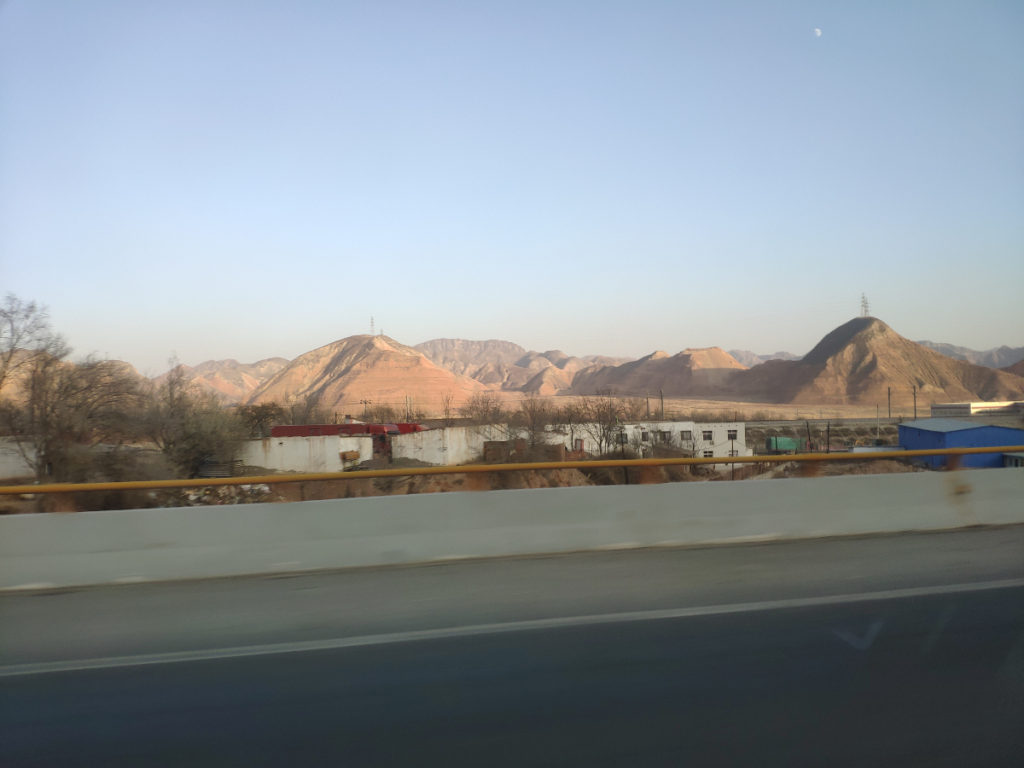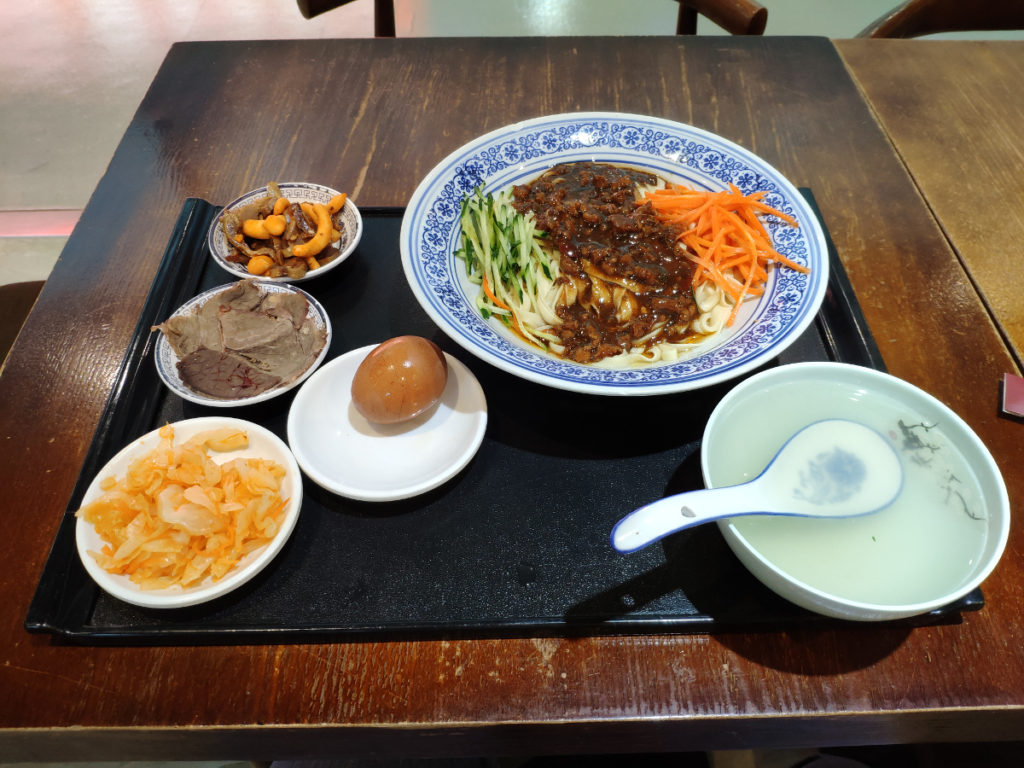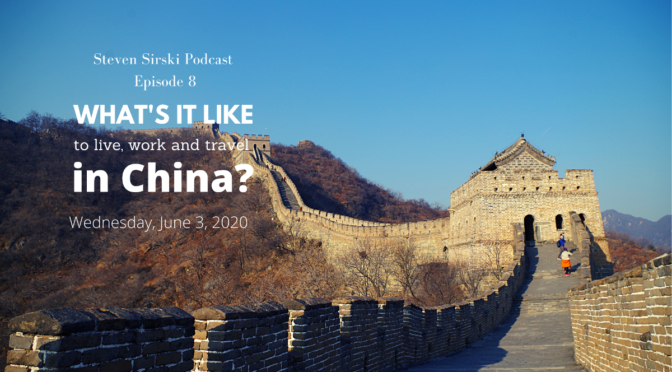Recorded Wednesday, June 3rd, 2020.
So what is it like living in China?
Contrary to popular belief, the Chinese word for the country does not mean “the middle path”, it refers to the centre of the world within which the Chinese nation sees themselves as occupying. Zhong Guo, or, “middle country”, means they are in the middle of the world, not that they choose the middle path or some sort of moderation.
TRAVELS
Have I travelled much of China?
I did take the train from Beijing out West and eventually left China to Kyrgyzstan. Stopped off along the way, Yinchuan, Xining, Hohhot, Turpan, Taklamakan Desert (saw a truck turned over), Kashgar.
Also did a trip up to the northeast, DongBei, as it’s known, Harbin, Dalian, we often go there for work, too. Then took the train down to Hangzhou before flying down to Hong Kong to see my parents.
Have not been to Yunnan or Tibet just yet.
Four big mountains to visit, I don’t think I’ve been to any. Always lots of people.
Each province has its own claim to fame, but a lot of it has been “modernized” is how they put it but, seriously, all of the tourist destinations look the same, same brick, same snacks, same souvenirs, same language.
What’s it like to travel?
Green trains are slow and stop off at every station. This is both a very gritty experience and where you will meet the more common person in China. A lot of farmers or migrant workers, very few people will speak English on these trains. Very different from the high speed train experience.
High speed trains max out at 350 km/hr, sounds fancy but doesn’t feel it like. It’s a very smooth ride. clean, usually a food cart with the same generic food available.
Airplanes I think fly lower than in other parts of the world, one reason is fuel economy, the other is because the air space is pretty much controlled by the military. Hence, lots of turbulence when you travel.
Haven’t driven across the country, nor taken the bus, but I have seen the large inter-city buses go by. They look alright, not too rough or worn but certainly not like the high speed trains.
LIFE IN THE CITY
Life in the big cities, Beijing, Tianjian, Shanghai, is probably pretty much like anywhere else. A lot of people speak English well enough. Sometimes you can find French or Italian or German speakers, but not too many.
Modern amenities, most you can find, the Amazon equivalent here is Taobao or even Jing Dong, online shopping. They cracked down on fake goods a few years ago so there isn’t as much of a worry about quality, though you still need to do your research. You pay a cheap price, don’t expect it to last very long.
Food delivery is popular, which I can see leads to a lot of waste, but with the new recycling program in place, hopefully things are being recycled at least in some amount. Though it’s hard to say as I don’t think anyone has asked where it all goes.
Buses, subways, taxis, Didi, share bikes, all sorts of transportation available
Trains, planes and buses to all parts of the country, superhighways have been built connecting a lot of the country so people can drive and, the main reason, is to move stuff more efficiently across the nation.
A lot of the big cities have been re-done in recent years (again), the great red-bricking of several hutongs, or neighbourhoods, a few years back in Beijing closed down a lot of illegal structures and people from working. Basically, people would come to the city and set up shop and some times add on to an existing structure without proper approval or safety measures in place, and this led to all sorts of problems. So the government said no more.
That being said, most of the big cities will all look the same: train stations and airports are all nearly identical. If you’ve heard of Stalinist architecture, then what you’ll see here in China is Communist architecture.
The smaller cities have fewer English speakers, though usually some shop keeper’s son or daughter knows enough to get by. This isn’t always a problem these days because of the presence of cell phones and the internet, it’s just become easier to translate and communicate.
- Big sites to see are the Great Wall, Tiananman Square, Forbidden City, Summer Palace, if you have time; (***The places I wanted to mention in the podcast were Jinshanling and Jiankou.)
- in Xi’an there are the Terracotta Warriors and a couple of big pagodas, namely the Big Goose pagoda;
- Shanghai is worth a visit throughout the city, the Bund, there’s a big park to go visit, can’t remember the name;
- Tibet and Xinjiang would be difficult to see within a short trip and, in reality, there isn’t all that much to see rather than experience the journey through those places. They are beautiful so there’s lots of natural places to see, but bear in mind the culture is different and so is the language, or at least it was a few years ago when I visited. Sadly, never got to Tibet just yet.
- Northeast is a bit more Russian-influenced and surprisingly, quite a few German engineers because of the car plants up there. Also, Korean influence, and you can visit Dandong, which is the Chinese city overlooking the river that leads to North Korea. If you want to go to North Korea you have to go with a tour group through Beijing.

Smaller cities you’ll get looks from people. You could speak some Chinese with them and it is here that you’ll find people more responsive to broken or bad Chinese rather than in the bigger cities. In the bigger cities they often don’t want to deal with the language barrier, but they treat Chinese people the same way so try not to feel too bad.
Small city is relative term, could be a few million
Village is more appropriate, ie, a few thousand people total. If these towns neighboured any of the big cities than they were usually swallowed up and became part of the larger cities
Cost of living
I don’t understand how people afford cars here, the average monthly wage is somewhere around 8000 RMB – or about $1200 CAD; but the national annual average is lower than that. Most people in my neighbourhood make about 12,000 – 15,000 RMB per month, but either they live with family or they rent a room in a larger apartment.
And that is something to consider as well, that a lot of these apartments are owned by other people who bought them all up in the great building expansion that lasted from 2005 to 2015. And a lot of this building expansion is what makes a lot of the bigger cities look the same.
Foton is the brand name of truck I see a lot of, I haven’t seen it anywhere else.
Electric vehicles are becoming more popular, not just due to environmental concerns but because it’s easier to get a driver’s license if you get an electric vehicle instead.
Learn more about the cost of living in Episode 5 – Chinese Changes:
Money and Taxes
A lot of things are becoming digital. Banking, paying, tax claims, etc.
Alipay and WeChat, scan a QR code to pay or transfer money. You can still use physical money but then you have to worry about it being exchanged for fake bills (as has happened with 100s and 50s) or lots of coins, which aren’t worth carrying around.
Apple Pay isn’t used as much, Google Pay doesn’t exist.
When you come here to work and open a bank account, make sure you know how the bank set up your name. For the longest time I couldn’t use WeChat because they had just written my name down as it was displayed in my passport: LAST NAME, FIRST NAME, all caps, one word. Took a while to figure that one out.
They have instituted some new tax policies starting in 2019. This includes being able to tax your world wide income if you are a resident of China for more than six years consecutively. But, if you leave China for 31 days, this breaks, or interrupts the six year contiguosness and so your “residence count” starts again. So, basically, leave the country for a month or more at least every few years.
Not a bad thing being a resident for tax purposes, especially if it’s your only source of income, you can claim deductions for education, rent, mortgage interest, elderly care, and a few others. China has just started this and so there might be a few kinks to iron out.
Food
What’s the food like? Not like in Canada or other places.
Regional dishes, most of which can be found in the larger cities with some modification. Street food is alright, the one I like most is jian bing, a wrap made from batter and an egg, some greens, spice, and fake chicken or sausage of your choice. Honestly, better tasting than McDonalds but by no means any healthier.
There is another snack, stinky tofu, which tastes exactly as it smells and, although not entirely bad, is mostly famous for its fragrance rather than its flavour. Try it, but you’ll have to hold your nose.
There is a common saying that you should eat where the locals eat. Tough call on that one, you’ll see locals eating in a lot of places. Sometimes a place is empty because it’s off-peak. That being the case, jiaozi and baozi are the famous national dishes, cheap and plentiful. Basically, they’re dumplings and then you dip them into a a soy, vinegar, spice and garlic sauce. I don’t think I’ve ever had them outside of China!
Lots of noodle and rice dishes, all of which have different names and all of which will be said to be “delicious” but, really, there are two types of noodle dishes: hand-pulled or packaged. Hand-pulled noodles are typically thicker and the Muslim restaurants are famous for these types of noodles. The packaged-type noodles are similar to the ones you find in packaged ramen around the world. Usually served in a broth of some sort but I prefer them dry so I don’t splash all over my clothes.
Beijing roast duck is famous and rightfully so, but expensive. For an extra few dollars you get to go back to the kitchen and choose the bird (not living) that you want. They’re all pretty much the same size, it’s mostly for show. There is a process in eating Beijing roast duck, since you need the wrap as a base, some cause, veggies, including onion and garlic, and then the duck on top.
Hot pot is the other famous dish, mostly from Sichuan, yes, the spice capital, but available around the country. Boiling oil in varying degrees of spiciness, meats and vegetables, and you’ll probably want a cold beer or soda water to go along with it because the hot water they’ll serve you won’t cool you mouth properly if it’s too spicey.
As for desserts, I’ve always said that China sort of lacks in the dessert department but, after some thinking, there are a few issues with the desserts I see and have tasted in China, and these aren’t necessarily negative.
First, they’re mass produced. That is, with the development of factory-food, desserts seem to be the foods that were most likely to be produced in a factory and then shipped all over the country.
Second, if you do find “natural” desserts, they’re often some sort of bread and, finally, not very sweet. In essence, you won’t be finding a rich banana bread made in the Chinese style, but you might find an egg dish made into a dessert.
I think the Mid-Autumn Festival’s mooncakes most exemplify this type of dessert, come in a variety of flavours, red bean, century egg, plain, but I’ve never seen a Nutella-filled mooncake or a custard of any sort which, to me as a Westerner, would make it like a donut of sorts.
And then there are others such as zongzi (for DuanWu festival), hawthorns, sticky rice, which are usually only found at certain times of the year.
- Other provinces have their famous dishes: types of noodles, types of rice, meat, Xinjiang is famous for its melons and skewered lamb
- Lanzhou lamian – a special type of hand made pulled noodles usually with pork
- Shanxi dao xiao mian – specially cut noodles, small pieces
- Xian yang riu pao mo – soup with bread, and Muslim dishes in Xian
- Riu jia mo – stuffed meat bun
- Wuhan and those areas have re gan mian – a type of dry, spicy noodles
- Yuan Xiao – sticky rice balls, usually eaten Yuan Xiao Jie, for dessert
- Jia jiang mian – a type of “dry” noodles, but different from South Korean jia jiang mian

LANGUAGE
Mandarin Chinese uses the simplified characters, but most of the characters used in Chinatowns around the world are Traditional, which is also used in Hong Kong and Taiwan.
Do you need to learn the language?
First, it is a very difficult language because the minimum number to know in order to get by is rather high. Second, the characters don’t give any indication as to their pronunciation, so crash-learning the language is difficult. Spoken Chinese is easier, though your tones will suck. Listening might be difficult especially as you travel throughout the country since each region has its own dialect and pronunciation.
If you’re only going to the big cities you won’t have many problems only speaking English, but Beijing and Shanghai would be the places that speak more English than other “bigger” cities.
Cell phone, internet connection, translation software, those are your friends if you don’t want to spend the time trying to figure the language out.
Other than that, Ni Hao, Xie xie, dui bu qi are your common courtesies that you should spend some time on (Hello, thank you, sorry!). Duo shao qian, how much can be used to practice your pronunciation but, if you’ve loaded up Alipay or WeChat with money then it doesn’t matter. Scan and go.
CULTURE
Modern music, Mandopop, not very famous, though Jay Chou, from Taiwan, is pretty popular. Other than that, most kids talk about Western pop music. A lot of the pop music you’ll hear is very soft or gentle, lots of love songs or “you broke my heart” songs. There was a burgeoning hip hop scene but that was squashed a few years ago by the powers that be. Metal exists mostly underground, and I have found some music by some bands out of Inner Mongolia, but not much else.
Basically, if the music doesn’t have a positive message, then it won’t be allowed. Love is the easiest to utilize.
Movies still focus a lot on traditional stories but there is an increasing amount of Chinese nationalism in current cinema. Wandering Earth, based on the book by Liu Cixin is one example, in which the Chinese people lead the world away from disaster. The Three-Body problem, which precedes the Wandering Earth, is probably the most famous modern work of science fiction here in China.
Science fiction is popular, mostly because the problems of society can be shifted to “the other” so the books can be read like an instruction manual of sorts in that bad things happen to others who don’t know how to moderate themselves.
Most of the “famous works” from China are ancient or traditional in nature. Confucius, Lao Tze, Sun Tzu, Mencius, etc.
There are the four great books, Dream of Red Chamber, Journey to the West, Romance of the Three Kingdoms, and Water Margin. All the kids read portions of these books in school or university in their Chinese class. None of them would recommend that you read them, much like no one would recommend a high school requirement to anyone learning English!
Further, these have been made into modern movies so, if you’re really interested, you can find the Chinese-speaking versions of these and get through them in a few hours rather than few months.
Popular Chinese-made movies include, Wolf Warrior and its sequel, Farewell My Concubine, but, I’ll point you to the TimeOut Beijing list of Top 100 movies in the Mainland since that list is pretty extensive and those movies are pretty easy to find. I’ve watched a few of them, notably The Sun Also Rises (太阳照常升起) and Peacock (孔雀). Although some are a bit art house, some are pretty “mainstream” such as The Message (风声) or Hero (英雄). Then there is the Nanjing Massacre which was originally written in book form by Iris Chang and subsequently made into a movie called City of Life and Death (南京! 南京!), which is a very sad movie to see.
- The 100 Best Mainland Chinese Films – http://www.timeoutbeijing.com/m/timeOutArticleDetail.html?id=2606
I don’t watch a lot of TV in China but soap operas or “dramas” seem to be the thing to watch. Cross talk is a popular back-and-forth comedy performance usually presented on stage but also broadcast on TV. I’m not sure people usually follow TV series more than they simply watch whatever is available on Iqiyi or whatever just to pass the time at their job. WeChat is the normal pastime, now TikTok, and Weibo. So if it’s not on there, chances are no one’s going to see it.
For more on China, visit my page dedicated to all of my posts about living, working and travelling through China:
